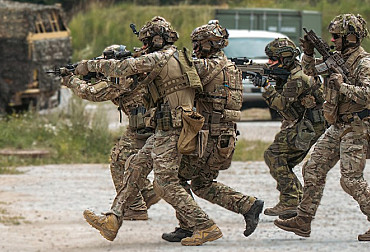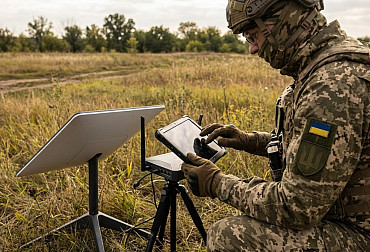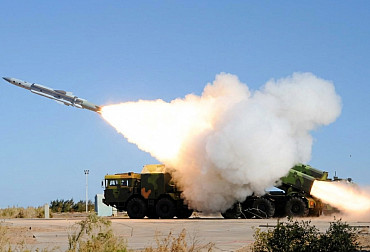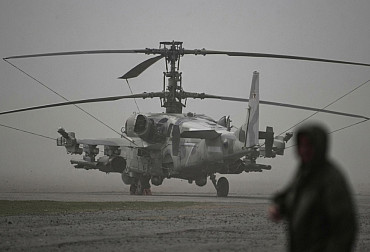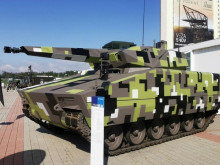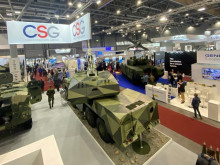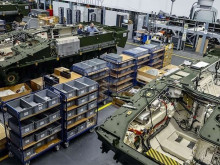The Defence Committee discussed the new Director of Military Intelligence and the future of unmanned aerial vehicles in the Czech Armed Forces
Right at the beginning of the meeting, Defence Minister Jana Černochová introduced the nominee for the position of Director of Military Intelligence (VZ) after Lieutenant General Jan Beroun. His military service commitment ends in October this year. The new director, if his nomination is approved by the government at today's meeting, will be Brigadier General Petr Bartovský. The presentation of the new Director of Military Intelligence has put an end to speculation about the possible end of General Beroun. He will probably remain in the state service even after he finishes his work in the VZ.
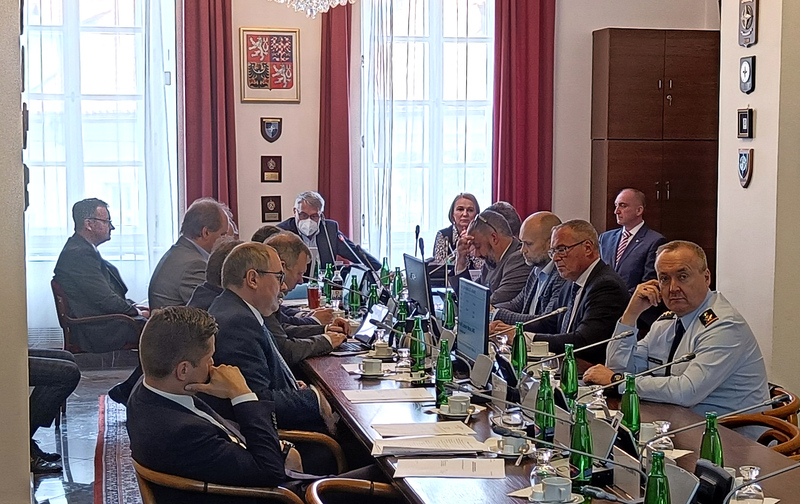
The Minister said that, as in the case of former Chief of the General Staff of the Czech Armed Forces General Aleš Opata, who became the Czech Ambassador to Lithuania after completing his service in the army, she would like to seek further employment for General Beroun in the state services in cooperation with, for example, Prime Minister Fiala's security advisor Tomáš Pojaro, given his experience, expertise and work record.
Lieutenant General Jan Beroun took over the Military Intelligence Service on 22 October 2014 and with his team, in which General Bartovský also served for a long time, he built it into a respected intelligence service. Brigadier General Petr Bartovsky has been a career soldier since 1994. In 2001 he joined the Military Defence Intelligence, which four years later merged into the Military Intelligence Service. He has held several senior positions in the VZ. He also served in missions in Kosovo and Bosnia and Herzegovina. Minister Jana Černochová told the committee, "My intention is that the decision on the successor to Lieutenant General Beroun should be made without unnecessary speculation and with sufficient time in advance so as to maintain continuity in the leadership of the Military Intelligence, which is essential in view of the current security developments in Europe and the world."
General Bartovsky described to the MPs how he would like to continue to lead the VZ and with what goals: "The continuity of the service must be maintained with all the attributes that are currently in place, with one of my main goals being increased internal coordination of the service so that its capabilities and capacities are maximally used. And at the same time, it is important to intensify and increase the internal cooperation of the Czech security forces, i.e. the Military Intelligence (MI), the Security and Information Service (BIS), the Office for Foreign Relations and Information (UZSI) and the Police of the Czech Republic, which is particularly needed at this time," the general said, adding that he will also continue activities related to supporting the warring Ukraine. Among other priorities, he said, are personnel and financial issues, so that the functionality and performance of the intelligence service is not compromised.
Large-scale movements of soldiers and equipment on the territory of the Czech Republic
During the next item of the Committee meeting, namely the routine discussion of information on the overflights and passages of armed forces of other states through the territory of the Czech Republic in the second half of 2023, 1st Deputy Chief of General Staff Lieutenant General Miroslav Hlaváč drew attention to the large-scale movements of soldiers and equipment that were directed to this year's exercises on the territory of the Czech Republic, which are taking place between April and May this year. This is the Immediate Response 2024 exercise, which is part of a series of alliance exercises called Steadfast Defender 2024, the largest NATO military exercise since the Cold War. A total of 1 173 troops will take part in this exercise. "Approximately three hundred and fifty soldiers are members of the Czech Army and eight hundred and twenty-three are from the United States of America," said General Hlaváč. Since 16 April, the soldiers of the so-called "advance party", which ensures the preparation of the entire exercise, have already been on our territory. The general also said that from 16 April to 5 May, the equipment is being moved to the Libava military base, where the actual exercise will take place, from 5 to 19 May.
This training, he said, is for the U.S. military to practice the strategic movement of people from the United States to Europe, as well as the movement of equipment and materiel that they have ready in depots here in Europe, in this case in the Federal Republic of Germany. "The arrival of the training troops will take place between 3 and 5 May, when the US troops will arrive on commercial flights from the United States to the Leoš Janáček Airport in Ostrava, and then the personnel will be transferred from this airport to the Libava military area. From 24 to 25 April, the Rozvadov crossing and our motorway networks will be used to move equipment to the Libavá military area. From 26 to 28 April, the movement of equipment will take place along another corridor, via the Krnov and Cínovec crossing, again along established axes to the Libavá military area. At the same time, from 2 to 3 May, the Rozvadov crossing and our motorway network will be used to move Czech troops to the Libavá area," said 1st Deputy of the National Defence Forces Lieutenant General Hlaváč. According to him, it is a verification of our army's ability to ensure the movement and stay of allied troops on the territory of the Czech Republic (HNS - Host Nation Support). At the same time, it is a unique joint exercise and cooperation of our and American troops on the territory of the Czech Republic. General Hlaváč thus refuted media speculations about secret movements of American military equipment to Ukraine, which appeared on social networks.
Czech Defence Standards
Next, the MPs dealt with the issue of Czech defence standards (ČOS). On this point, the Minister of Defence stated that they are mainly used to implement NATO standardisation agreements, roughly 96.4% of the agreements. The need for the elaboration of Czech defence standards is based on the obligation of the Ministry of Defence, or the Czech Republic, to meet its alliance obligations arising from NATO and EU membership and also the necessity of compatibility of the procurement of commodities and services for the needs of the Czech Republic with EU and NATO standards. "In order to ensure maximum support for the Czech defence industry, all entities in the Czech Republic have the opportunity to participate in the development of Czech defence standards by participating in the comment procedure. As of 18 April 2024, we have 334 valid Czech defence standards," said the Minister.
At the same time, the Minister of Defence introduced to the MPs the new Director of the Office for Defence Standardisation, Cataloguing and State Quality Verification, who is retired Brigadier General Jaroslav Linhart as of 1 January 2024. The office, he said, represents, records, preserves and makes available these standardization agreements, and ensures the creation, approval and issuance of standards. "A huge benefit is that we form a Czech defence standard in about 14 months and the Czech Defence Industry Association and the whole public can comment on it in the so-called second reading," said Director Linhart, adding that every Czech defence standard is revised once every three years. If necessary, any external body can request a revision of the standard.
Support of the domestic defence industry by the Ministry of Defence of the Czech Republic
In the next session, the MPs returned to the Ministry of Defence's long-term support for the domestic defence industry. According to Minister Černochová, support for the Czech defence industry has long been one of the main priorities of the Ministry of Defence. It is enshrined in the 2023 defence strategy, where the defence industry is explicitly mentioned as one of the pillars of defence. "The key role of the defence industry is to ensure security of supply for the combat sustainability of the armed forces in the performance of their tasks related to the defence of the territory and international commitments. In view of these tasks, the further development of the defence industrial base of the Czech Republic is absolutely necessary," said the Minister. She also recalled that she has been working for a long time to involve the Czech defence industry in the system of so-called economic mobilisation, to promote exports, to use economic diplomacy, to promote dialogue between the army and the defence industry and to promote industrial cooperation within the framework of strategic acquisition projects.
The Czech Republic is also involved in the process of preparation and approval of the European Defence Industrial Strategy and the related European Defence Industrial Programme. Within NATO, the Czech Ministry of Defence participated in the establishment of the NATO Innovation Fund and the launch of the pilot phase of the DIANA Defence Innovation Accelerator. The package of support to the Czech defence industry also includes cooperation with universities and scientific institutions and many other steps of long-term support.
The great importance of long-term support for the Czech defence industry was also confirmed to CZ DEFENCE by the chairman of the committee, Lubomír Metnar, who wants to deal with this issue on an ongoing basis. "The domestic defence industry is an essential part of our defence capability. We need to know what plans the ministry has for the future and how it will support the domestic defence industry. Not only in the context of a leapfrog budget increase, this will translate into a more intensive involvement of the domestic industry. The Ministry of Defence must take a number of steps to make effective cooperation work. We have discussed a number of areas. There is a government-approved strategy document on the Development and Support of the Domestic Defence Industry, which was last amended or updated in 2021. We are well aware that the security situation in Europe and at home has changed in terms of armaments. I have prepared a number of questions in this sense," Metnar said. He also praised the ministry's steps to straighten ties with commercial banks and support small and medium-sized companies. "If you take this year alone, when more than CZK 72 billion of the budget was allocated for investments, almost 40 percent of this amount goes to foreign projects. So this is quite alarming news for me," Lubomír Metnar told CZ DEFENCE, adding that he would again remind the defence committee that he would keep returning to this issue during its meetings.
At the end of the meeting, Josef Bělica resigned as chairman of the Subcommittee on Defence, Cyber and Security Policy and Strategic Concepts of the Czech Republic. The move was in response to his appointment as Governor of the Moravian-Silesian Region.
The future of unmanned aerial vehicles in the Czech Armed Forces
The conclusion of the Defence Committee meeting on the future of unmanned aerial vehicles was then held in a restricted mode. Therefore, we asked the rapporteur of this item, Vice-Chairman of the Committee Jan Hofmann, about this topic after the Committee meeting. However, it will be smaller drones, it will not go the way of the biggest ones, and there will be a lot of them. And indeed I can confirm that the way the Army's strategy is set up, by 2035, drones should be part of not only the 533rd Unmanned Vehicle Regiment, but all the others."
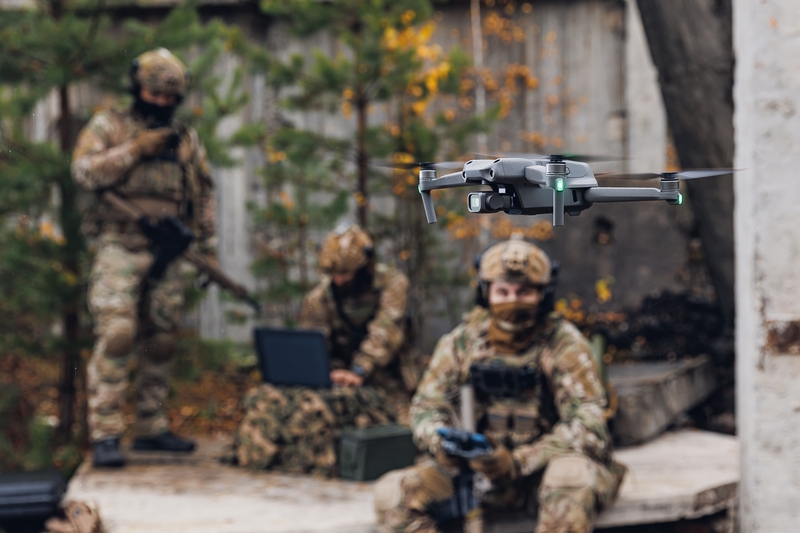
We also asked the other committee members about drones, who were asked the following question: What is your assessment of the Army's plan for acquiring unmanned vehicles in terms of types and quantities?
Lubomír Metnar (ANO), Chairman of the Committee
If I speak in general terms, let's say that this relatively new trend in the acquisition of unmanned aerial vehicles is based on the experience of the wars in Ukraine and the Middle East. As regards the specific plan that the Ministry of Defence has, it has communicated this information to us in a classified mode, and for this reason I cannot comment on this topic in a relevant way.
Jan Hofmann (ODS), Vice-Chairman of the Committee
The Army has backed away from buying medium-sized unmanned aerial vehicles. Instead, it wants to buy a larger number of small machines, mostly for monitoring purposes, and to build on and expand existing assets already in use, such as the Puma, Raven and Scan Eagle. This strategy makes sense to me. It is based both on the lessons of the battlefield in Ukraine and on the financial possibilities of the defence budget.
Josef Bělica (ANO), Member of the Committee
The need for unmanned vehicles is emerging as one of the important requirements. The Army has presented a fairly reasonable plan, with the understanding that only the future will show if this approach is correct. At the present time, when we see how cheap unmanned vehicles will completely overwhelm air defence at a relatively low cost, it is simply important to have such vehicles in the arsenal. Another important aspect is to cover the whole spectrum of challenges with these assets, from reconnaissance and support to munitions.
Stanislav Blaha (ODS), Member of the Committee
I believe that the reconsideration of the purchase of 3 operational UAVs from last year and the decision to acquire 200 tactical vehicles is much better in terms of the current needs of the Czech Armed Forces. Today, tactical unmanned aerial vehicles can be considered as one of the crucial weapons that influence not only the development of the war in Ukraine, but also the conflicts in the Middle East. From this perspective, I see the response of the AFU to contemporary and future conflicts as positive and I fully support it.
Jiří Horák (KDU-ČSL), Member of the Committee
I consider the plan of the Czech Armed Forces to acquire various types and quantities of unmanned aerial vehicles for the armament of the Czech Armed Forces to be sufficient and clearly positive towards the modernisation of our armed forces. My impression is that our army does not underestimate this area of armament. As we can see from the war in Ukraine, the use of unmanned aerial vehicles is nowadays absolutely crucial for a quick and effective response to various security threats and challenges. I have no doubt that investment in such advanced technologies will contribute to increasing our country's defence capability.
Karel Krejza (ODS), Member of the Committee
The plan depends on the amount of resources and the concept. Today we see live that drones are becoming the "backbone" component. I consider the decision to buy 200 smaller drones to be a sensible one, and this is because part of the ground combat forces already have so-called ISR company sets in their sets. Our military already knows how to work with unmanned assets such as Wasp AE and Dragonfly quadcopters. These are great assets. However, we must bear in mind that small drones can never replace the medium tactical ones, the acquisition of which is envisaged only afterwards.











